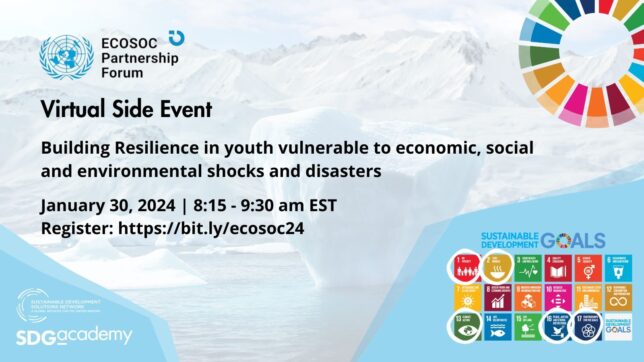

SDSN VIRTUAL SIDE EVENT – 2024 UN ECOSOC Partnership Forum
| Jan 30th 2024 | UN Partnership Forum Virtual Side Event Building Resilience in youth vulnerable to economic, social and environmental shocks and disasters | |||
| 08.15-09.30 NYC Time | SDSN in partnership with UNITAR, UNESCO, UCD, CLEANTECH Bulgaria and AIIDEV Africa. | |||
The UN ECOSOC Partnership Forum will be held on January 30th 2024.
Theme: “Reinforcing the 2030 Agenda and eradicating poverty in times of multiple crises: the effective delivery of sustainable, resilient and innovative solutions, with a special emphasis on the Sustainable Development Goals that will be reviewed at the 2024 HLPF, namely Goal 1 (no poverty); Goal 2 (zero hunger); Goal 13 (climate action); Goal 16 (peace and justice); and Goal 17 (partnership for the Goals).
In accordance with resolution 75/290A, the 2024 ECOSOC Partnership Forum will be focused on the exchange of new ideas, expectations and priorities for the work ahead for ECOSOC and the HLPF on the aforementioned theme. It will showcase relevant stakeholders through innovative partnerships that can mobilize commitments and actions to advance the 2030 Agenda for Sustainable Development..
Participants: “Stakeholders including countries, the United Nations system, international financial institutions, as well as international organizations, parliamentarians, local governments, non-governmental organizations, the private sector, civil society, scientists, academia, women, youth and others will participate”.
Outcome: “An analytical summary will be prepared to capture the key policy messages of the Forum along with messages of the Coordination Segment, which will serve as an input to the July 2024 HLPF ss well as the overall work of the ECOSOC and other key inter-governmental processes throughout 2024”.
UN Partnership Forum Side Event
Building Resilience in Youth Vulnerable to Economic, Social and Environmental Shocks
30 Jan 2024, 8:15 – 9:30 AM EST
Background
During this side event, we delved into emerging trends regarding the participation and attainment rates of youth in upper secondary, tertiary education, and vocational training, as well as their advancement into gainful employment. As the growing problem of youth non-engagement continues to garner global attention, speakers from various sectors emphasized the importance of implementing policies and making investments that focus on fostering equity and inclusivity in both educational and vocational training spheres to bolster the resilience of young people susceptible to economic, social, and environmental shocks. The discussion highlighted policies and practices designed to encourage well-informed and effective educational decision-making across various levels and included examining the role of vocational education and professional training in facilitating transitions towards employment opportunities. The intergenerational panel of speakers presented a comprehensive discussion on numerous interconnected issues related to youth education, engagement, and employment, underscoring the significance of policy measures, intersectoral partnerships, and strategic investments to tackle these challenges. In addressing youth inclusion and resilience the panel also envisioned collaborative endeavours of educators and practitioners across governmental, corporate, and civil society sectors, equipping them with pertinent educational content and training to actively participate in the labour force to advance sustainable development.
Chair
David Donoghue – Former Ambassador of Ireland to the UN
Speakers
Patrick Paul Walsh , University College Dublin and SDG Academy at SDSN
Elena Proden, UNITAR
Elizabeth Polyn Akauola, COP28 International Youth Climate Delegate
Maria Nakova,, CLEANTECH , BuildSkills Academy
Emmanuel Ola-Olowoyo, AIIDEV Africa, and SDSN Youth
Marielza Oliveira, UNESCO
Xianhong Hu, UNESCO
Key Issues discussed (5- 8 bullet points)
Adapting Education for Evolving Workforce: Addressing the ongoing educational transformations needed to meet the dynamic demands of a changing labor force in the age of digital and sustainability transformations.
Enhancing Youth Resilience: Prioritizing the resilience of vulnerable youth through targeted policies and investments, addressing economic, social, and environmental shocks.
Youth as Catalysts for Inclusive Societies and Sustainable Development: Recognizing the pivotal role of young people as catalysts in crisis response, recovery, and preparation for future shocks, contributing to inclusive and resilient societies and advancing sustainable development.
Global Issue of Youth Disengagement: Tackling the widespread problem of youth disengagement globally and underscoring the importance of fostering equity and inclusivity in both educational and vocational training realms.
Vocational Training for Seamless Transitions: Acknowledging the crucial role of vocational education and professional training in facilitating smooth transitions from education to gainful employment in jobs of the future, highlighting the significance of these pathways.
Informed Decision-Making in Education: Promoting well-informed decision-making in education across various levels, encompassing policies and practices that guide youth in making informed choices.
Key recommendations for action (5 – 6 bullet points)
Enhance Youth Capabilities in Digital Ecosystems: Address the need for diverse actions, including bridging digital inequalities and providing ongoing opportunities for skill enhancement, to empower young individuals for effective participation in evolving digital landscapes.
Vocational Education and Professional Training are Pivotal: Emphasize the crucial role of vocational education and professional training in facilitating smooth transitions from education to gainful employment in jobs of the future.
Strategic Opportunities for Advancement: Leverage microcredentials as a powerful catalyst to facilitate the transition towards a sustainable and inclusive future, recognizing the imperative significance of investing in pathways to improve education-to-employment transition.
Prioritize Equity in Policies: Craft and execute policies with a focus on equity and inclusivity in education and vocational training, ensuring universal accessibility to opportunities regardless of socio-economic backgrounds.
Stronger Public-Private Partnerships: Foster collaborations among educational institutions, government entities, and private sector organizations to synergize efforts, ensuring that education aligns with market demands and offering tangible training opportunities.
Recording of the Side Event.2024 ECOSOC Partnership Forum Virtual Side Event: Building Resilience in youth vulnerable to economic, social and environmental shocks and disasters – SDG Academy Library (kaltura.com)